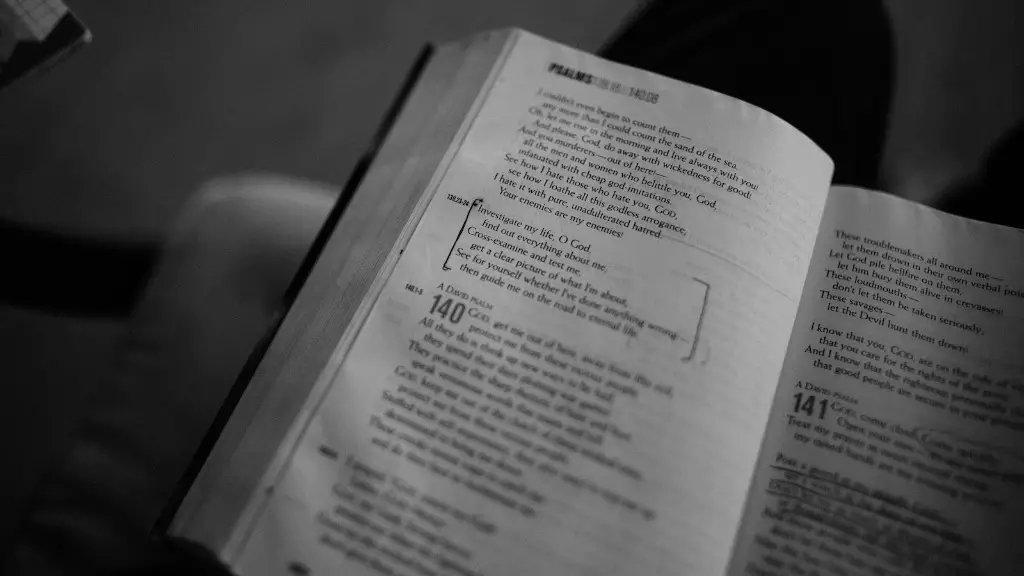The Bible is an ancient text with a great degree of cultural, spiritual, and social significance to many cultures around the world. It is one of the most widely-read, studied, and debated texts in history. However, questions have been raised about the accuracy of the text, whether it has been changed or tampered with over time, and whether the original words are still intact.
In examining the question of whether the Bible has been changed or tampered with, the first thing that must be recognized is the sheer age of the text. Many versions of the Bible have been translated and circulated over the centuries, often in different languages and geographical regions. This has resulted in some alterations as texts were translated for different audiences.
Additionally, much of the Bible’s original manuscripts have been lost or destroyed over the centuries. This has led to the debate of whether the true, original words of the Bible remain intact today. Scholars have also debated whether it has been changed intentionally or not. These questions are particularly relevant for those who believe the Bible to be divinely inspired, or for those who rely on its words for spiritual guidance.
It is important to note that there are some manuscripts from the original texts of the Bible, known as the Dead Sea Scrolls, which have been preserved and studied. These scrolls provide a valuable resource for scholars investigating the validity and authenticity of the Bible. However, some Bible critics suggest that even these manuscripts have been altered and adjusted in some way.
Historical Context
In order to better understand the debate around the Bible’s authenticity, it is important to look at its historical context. From the time the Bible was written, the text has faced numerous attacks, both from within and without. This fact has most likely impacted various textual variants, resulting in changes to different manuscripts.
For example, the fourth century saw Christian heresies, such as Arianism, which questioned the deity of Christ, and threatened the accuracy of the Bible itself. In response, a council of church leaders was convened in the year 325 to rule on which books were to be included in the Bible and which books were not. This council decided which books to include in the canon of the Bible.
The Protestant Reformation also had an impact on the Bible, as theGerman reformers, such as Luther and Zwingli, challenged the authority of the Catholic Church, which has had a major influence on the Bible. This led to a revision of some texts and translations, as Protestantism gained more influence and popularity.
These examples, along with many others, demonstrate that the Bible has changed over time, as different versions and translations have been produced. However, the debate arises over whether these changes have been made intentionally and maliciously, or if they are simply changes that naturally occur over time.
Modern Analysis
Today, scholars continue to debate the issue of whether the Bible has been changed or tampered with. Much of this debate centers around the various textual variants and manuscripts of the Bible, and whether certain words or passages have been added or removed intentionally.
In modern times, the most widely accepted thinking is that while some changes may have been made, they were not intentional and do not alter the core messages of the Bible. This belief is based largely on the sheer number of ancient manuscripts that have survived and been studied by scholars.
For example, Daniel Wallace, a professor at Dallas Theological Seminary, asserts that the study of ancient manuscripts shows the Bible is largely free from errors and manuscript tampering. He cites the example of the Dead Sea Scrolls, which date back to the 2nd and 1st centuries BC, and contain significant portions of the Bible. He also observes that nearly 6,000 ancient manuscripts of the Bible exist, which is remarkable given the age of the text.
Wallace’s research does illustrate that errors do exist in the Bible, but these are largely errors of transcription, which again, does not indicate intentional tampering. He concludes that the Bible is still the most reliable ancient document and that the core messages remain intact, despite the changes over time.
Modern Applications
Despite the debates and arguments that have surrounded the Bible since its inception, it remains one of the most influential texts around the world. Many people still consider it to be an authoritative source of moral and religious guidance, and these spiritual teachings are still widely applicable and relevant today.
The debate around whether the Bible has been changed or tampered with continues to be a hot topic of discussion, and it is likely that this debate will not reach any definitive conclusions in the near future. Nevertheless, the Bible still remains a foundational text for many people, and has greatly impacted how people think and act for better or worse.
For those who consider the Bible to be the inspired word of God, it is important to recognize that the core message remains despite differences in some translations and manuscripts. After all, the Bible itself warns us against interpreting it in a literal way, instead encouraging us to interpret it in a spirit of humility and openness to other insights and perspectives.
Analysis of Critics
Critics of the Bible have long argued that its text has been tampered with over time, and that its original words are no longer intact. These critics are often focused on the textual variants, which have different versions of the same passage, and believe that these are proof of intentional tampering.
While it is true that textual variants exist, this does not necessarily mean that the original words of the Bible have been changed. In fact, scholars agree that textual variants are mostly the result of incomplete or inaccurate copies of the text over time, and significant discrepancies in manuscripts are relatively rare.
Furthermore, the existence of textual variants does not necessarily mean that the core message of the Bible has been corrupted or changed. Scholars agree that the main teachings and themes of the Bible are still largely intact, despite minor changes to certain passages. Also, some variation between manuscripts may provide insight into how the interpretation of Scripture has changed over time.
The debate around this issue is likely to continue, and will no doubt continue to be an important topic of debate and discussion among scholars. Ultimately, the verdict must still fall to the reader, as everyone’s interpretation of the text will be different and ultimately, subjective.
Counter-Arguments
Although many scholars agree that the Bible has not been changed or tampered with, there are also counter-arguments to be made. For example, some critics have argued that the text has been purposefully altered to support certain political or religious agendas. They point to the Council of Nicea and other such events as evidence of this.
Furthermore, there are those who believe the Bible has been changed over time to reflect the biases and cultural norms of the time. They argue that certain passages may have been altered, or certain words changed, in order to better reflect the cultural values of the day.
It is also important to note that this debate is often framed in terms of religious and spiritual truth, making it difficult to assess objectively. Ultimately, it must be remembered that all interpretations of the Bible, whether positive or negative, are still subjective and open to debate.
While it is possible that the text of the Bible has indeed changed over time, the core message, teachings, and values of the Bible remain largely intact, and ultimately, it will be up to the individual to decide which version of the Bible is most reliable and trustworthy.





